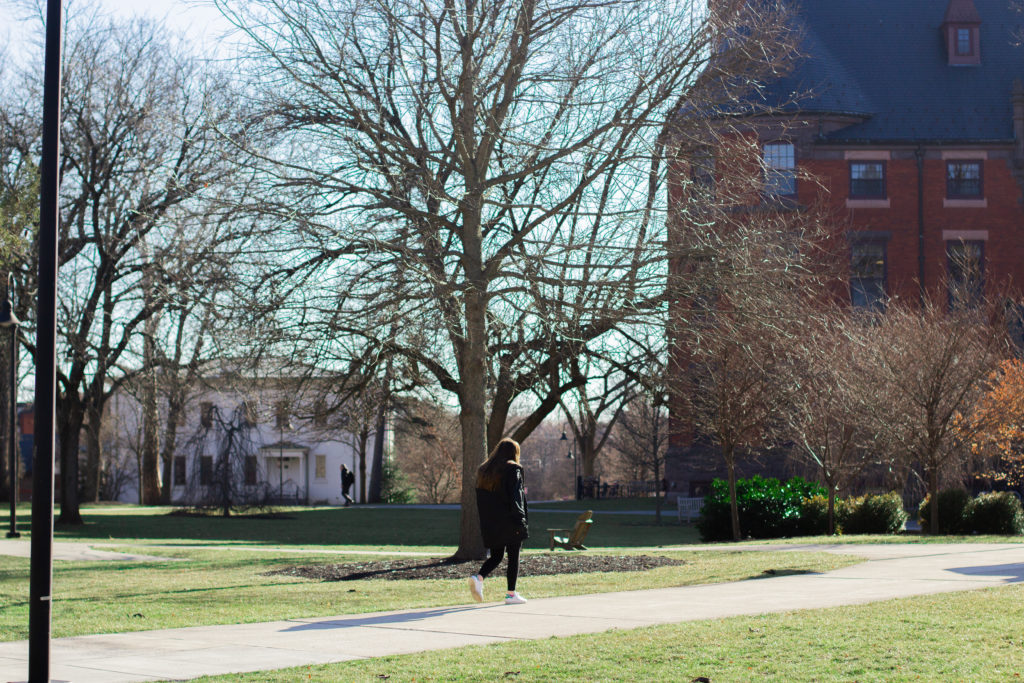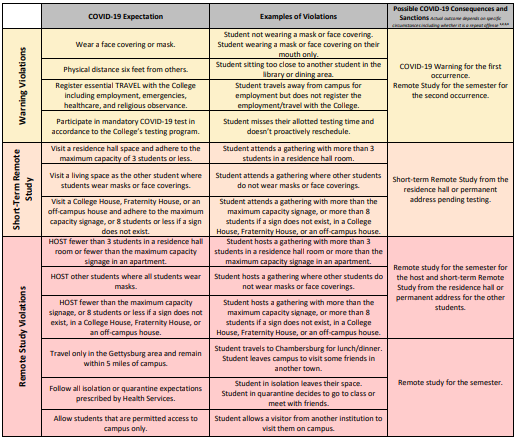College Announces Updated COVID Guidelines Ahead of Spring Semester: More Testing, a Move to Single Bedrooms, and ‘Increased Enforcement’
By Phoebe Doscher, Magazine Editor, and Nicole DeJacimo, Content Producer
Dean of Students Julie Ramsey sent out a campus-wide email Tuesday afternoon ahead of the spring 2021 semester detailing the COVID-19 testing plan, housing process, and the updated Rules and Violation Rubric. Sophomores, juniors, and seniors are slated to return to campus for the start classes on Feb. 1, and the latest communication outlines changes to the preexisting guidelines from the fall semester, including the intent to house students in single bedrooms and more stringent COVID-19 policies and sanctions. The college will monitor the state of the pandemic and adjust planning as needed, with the knowledge that the “pandemic is a very fluid and changing situation,” according to the email.
Increased Testing Capabilities
To increase the frequency of testing, the college opted for a new testing supplier which will enable a greater frequency of tests and may help to more quickly identify students exposed to COVID-19. The administration has yet to determine whether baseline testing will be required of students when they arrive on campus in February.
All students will be required to test twice a week, whether they live on campus, off-campus, or commute to the school. These testing times will be previously scheduled.
Housing Changes: A Pivot to Single Bedrooms
The college has decided to assign primarily single bedrooms to students returning to campus in an effort to mitigate the spread of the virus. Prioritizing the use of single bedrooms will aid in quarantine measures and avoid the potential for disruption caused by relocating students in the middle of the semester. Greater capacity for quarantine housing was one of lessons learned by administrators after the college made the decision to de-densify in September.
In the fall, Dean Ramsey explained to The Gettysburgian that one of the factors behind the decision to send the majority of students home was the risk of running out of space for those who tested positive for COVID-19. “It’s possible we would have seen a tremendous spike in cases, and if we had, we literally would have run out of quarantine [housing],” she said.
For the spring, lottery numbers will be assigned at random among each grade, prioritizing seniors, then juniors, and lastly sophomores. Students will still be allowed to choose suitemates and apartment-mates, and the housing rates will not charge everyone for the price of a traditional single room. Cost will reflect the residential buildings chosen by students.
Those who have been approved to live off campus for the 2020-21 academic year are still permitted to do so and will have access to campus. Students who have opted to live off campus and have not elected to study remotely will also have access to the college’s required testing. No further approval for off-campus housing will be conducted at this time.
The College has yet to determine whether leased off campus hotels will be used or if the College House program will be feasible. The College expects to have more clarity about housing after students complete their intent form by Dec. 15.
Compliance: ‘Increased Enforcement’ and ‘More Stringent Penalties’
After consulting student and faculty advisory groups throughout the fall semester, Gettysburg chose to clarify the COVID-19 Health and Safety Rules and Violations Rubric by committing to increased levels of enforcement and harsher repercussions for violators. Rather than signing a Student Health Agreement, students are expected to agree to the expectations in their Intent Form, which must be signed by Dec. 15 by those who wish to return for an in-person spring semester.
Each living unit and common room space will have a posted maximum capacity sign. Residential rooms will not exceed three people per a room, and all visitors must wear masks. Also, only students who are a part of the Gettysburg College testing program are allowed in residential and common room spaces.
The college is also imposing travel restrictions on destinations more than five miles away. There are four exceptions to this protocol: health care visits, faith-based obligations, registered employment, and emergency situations. Students can travel beyond the five mile radius if they request approval ahead of time.
The possible consequences of violating these guidelines are as follows:
- Seniors who have multiple violations will jeopardize their opportunity to participate in commencement.
- Sanctions that are issued for violating a COVID-19 expectation are not eligible for appeal.
- Students who are assigned to Remote Study are not eligible for a 10% tuition refund.
- Students may be subject to the code of conduct and sanctions including probation, suspension, and expulsion.
Anna Cincotta ’21 contributed to this article.


